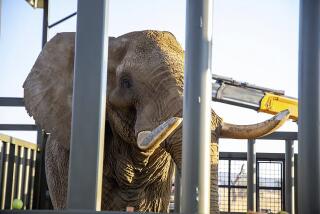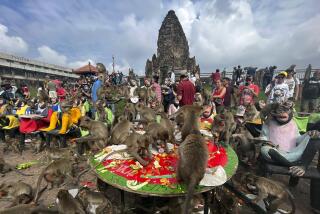Sumatra Battles Marauding Elephants
- Share via
GUNUNG BATIN, Indonesia — Michael Priyono straddled the tame elephant just after midnight and chased two of its wild brothers through the dense Sumatran jungle. Twenty miles later, the 37-year-old Indonesian government worker gave up.
“We’ll chase them again tomorrow,” he said.
Priyono, who heads a program to save elephants in the area, had hoped to capture the beasts after they strayed into a nearby coconut plantation and return them to a government reserve.
Indonesia officially protects its elephants and has set aside large jungle areas for the animals. But a shortage of food is leading more and more of the beasts into agricultural areas, forcing them to compete with man for space.
There are about 5,000 elephants in Indonesia, nearly all in the huge eastern island of Sumatra.
At least 600 live in the southern part, where many elephants have recently been roaming into plantations at night and knocking over coconut trees in search of the sweet sap inside.
By dawn, hundreds of trees lie strewn across the ground.
“This is just like a restaurant for them. It’s frustrating to see day after day,” said Ramon Arsajaya, project executive of PT Multi Agro Corp., which runs a private, 24,700-acre coconut and cassava plantation in the area.
Arsajaya said the elephants had leveled at least 250 acres of coconut palms in the last few months at his plantation alone. He said the trees would be replanted, but would take more than two years to produce coconuts.
Settlers in areas frequented by migrating elephants say most of their crops have been destroyed and at least one person killed by elephants in the last year.
Getting the animals out of cultivated areas and back to reserves is not easy.
“Chasing them away is a very dangerous job. When those elephants get angry they chase back,” Arsajaya said.
Priyono added: “Actually, they have no instinct to kill but if they are in shock or desperate, anything could be destroyed, even a bulldozer.”
Just before the start of his recent nighttime chase through the jungle, he had fired a tranquilizer dart at one of the wild elephants, but it bounced off the animal’s thick hide.
Priyono’s team from the government’s Elephant Domestication Center began work in early November in the Gunung Batin area, where Multi Agro and three other private plantations have had elephant problems.
The team tries to capture the young elephants, which are easier to train, and take them to the domestication center in Way Kambas, 45 miles away. The older animals are returned to the reserves.
“But this will solve only half the problem. The real problem is how to make sure those elephants never come back again,” one conservationist said.
Southern Sumatra’s jungles are big enough to hold more than double the actual number of elephants but there is not always enough food.
“Expanding and improving their habitat is a matter of money,” he said. “We haven’t got that.”
More to Read
Sign up for Essential California
The most important California stories and recommendations in your inbox every morning.
You may occasionally receive promotional content from the Los Angeles Times.










